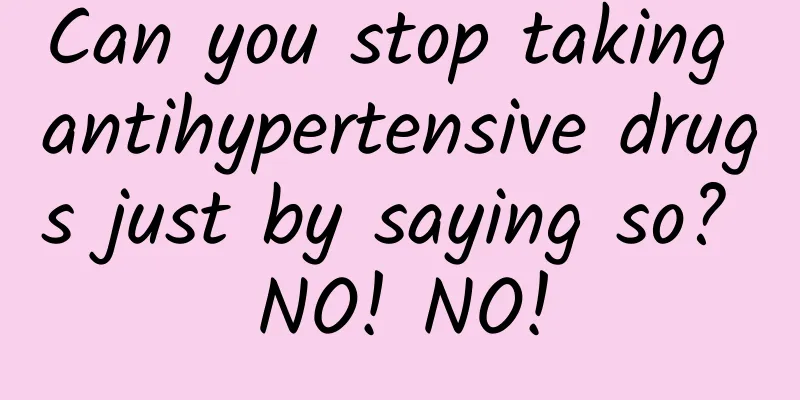Can you stop taking antihypertensive drugs just by saying so? NO! NO!

|
Some people often ask, "My blood pressure has been very good recently and is under control and stable. I want to stop taking the medication. Is that ok?" The answer is: No. Most patients with hypertension need lifelong antihypertensive drugs to control their hypertension. However, hypertension in some patients can be well controlled, and even a few cases only require single drug treatment. After maintaining blood pressure below the target blood pressure for 1 year, many patients want to know whether they can gradually reduce or even stop the medication. After a patient's blood pressure has been well controlled for at least 1 year, it may be possible to reduce or stop antihypertensive medications. Patients with the following characteristics have a higher success rate in stopping antihypertensive medications: (1) Relatively low blood pressure before treatment (meaning the number and dose of antihypertensive drugs used are low). Patients who receive monotherapy are most likely to successfully stop medication. (2) Initiate and maintain lifestyle changes (e.g., weight loss and sodium restriction). (3) Younger age: Although the likelihood of successful medication discontinuation in the elderly is lower than in younger adults, some elderly people are able to discontinue medication (18% in one study) [5]. Patients without these characteristics were significantly less likely to successfully stop medication and remain off it. How to stop taking medicine correctly? Approach to Medication Discontinuation - When attempting to taper antihypertensive medications, our approach is as follows: (1) For drugs with a long serum half-life (e.g., amlodipine, chlorthalidone), this regimen can be effective if the patient can comply with the regular dose (without missing a dose) by taking the drug on alternate days (e.g., odd-numbered days instead of daily). (2) For other drugs with shorter half-lives (eg, lisinopril), halving the dose is easier to implement and can be achieved by prescribing a new drug or a pill splitter. (3) We will closely monitor blood pressure after reducing or stopping antihypertensive medication, such as once every 2-4 weeks. It is best for patients to measure their blood pressure at home, but if this is not possible, they may need to visit the clinic to see a medical assistant, nurse, or doctor for a follow-up visit. If blood pressure is still above the target value, we will restart the previous dose of antihypertensive medication. If blood pressure is still well controlled after 1-3 months, we will stop the medication completely and continue to closely monitor blood pressure for 1-3 months. (4) Stop taking specific medications with caution: Abrupt discontinuation of short-acting beta-blockers (e.g., propranolol) or alpha-2 agonists (e.g., clonidine, guanfacine, guanabenz) may result in fatal withdrawal syndrome. |
<<: If blood pressure is stable, can the medication be stopped?
>>: Learn about prostate hyperplasia
Recommend
Can pregnant women eat shrimp?
Pregnant women certainly cannot ignore nutritiona...
Why does your skin become better during menstruation?
Many female friends often feel that their skin co...
How to relieve sore throat during confinement?
Confinement in winter is very comfortable. Not on...
Picture of leucorrhea washing rice water
Normal leucorrhea is usually white, thin and stic...
Menstruation ended after 15 days but there was blood in urine
Women have their periods every month, and normal ...
Breast nodules with calcification 4a
Is a breast mass with thickening 4a and blood dat...
Pain on the left side of the female back spine?
Back and spine pain in women is mostly caused by ...
What causes a long menstrual period?
Every adult woman will have menstruation every mo...
When is the best time to do moxibustion? When is the best time of the day to do moxibustion?
When you are free, you are calm and relaxed, not ...
Withdrawal bleeding is very close to menstruation
The occurrence of withdrawal bleeding is the main...
What should you pay attention to in the third month of pregnancy
Pregnancy will bring various different reactions....
Is it normal to have stomach pain after medical abortion?
It is normal to have abdominal pain within a few ...
What should I do if I have abdominal pain during menstruation?
I believe that every woman will have a few days e...
Early symptoms of diabetes during pregnancy
As the pace of social development becomes faster ...









